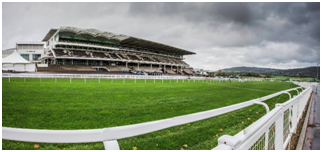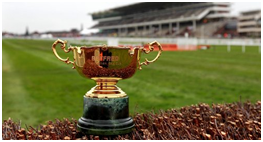One of the highlights of the of the National Hunt racing year, the Cheltenham festival has become an evocative and must attend event on the calendar for any serious race aficionado or a part time punter looking for a quick flutter. Set over 4 glorious days of jump racing, one of the main reasons it carry’s such a draw is that St Patrick’s day is at the same time. This brings loads of Irish racing fans to the town as it’s one of the easiest for them to get to (Ryanair puts on an additional 30 flights to Birmingham) and their horses usually dominate. A fact borne out by the 265,000 pints of Guinness consumed. Many racing fans say that you’ve not heard anything like the “Cheltenham roar”. It sounds as soon as the starting tape goes up and the first race of the four days begins!

Hard to believe but the festival’s home was not actually start at Cheltenham at all. Its official title at the beginning was the Grand National Hunt meeting (not to be confused with the Grand National at Aintree) and it began in Market Harborough. After that it spent some years at Warwick Racecourse before after several improvements to the ground it finally settled down in its permanent place at Cheltenham in its Prestbury Park home in 1911 where it has remained ever since. It wasn’t even known as the festival until some sterling reporter in from the Warwick Advertiser coined the term to describe it.
It’s most famous race is the Gold Cup. Raced on the final day it represents one of the premier National Hunt races of the season. Again, it’s surprising to find that this was not the main event but just a warm up for the County Hurdle. However, it soon became the jewel in the festivals crown. Despite it increased status it was initially seen as a warm up to race for the Grand National. To date only one horse has ever won both, the legendary Golden Miller who even did it in the same year of 1934. It’s now not so common to see trainers risk a horse in both races.

It’s not just about the Gold Cup though. The festival was extended to 4 days in the mid noughties so that there was a feature championship race every day. Other’s include the Stayers Hurdle (the oldest race at the festival and Champion Hurdle and the Queen Mother Champion Chase. All of these main races, and the minor ones combine to mean that on average £150 million pounds is bet over the festival. All hail to the Horses and the men and women who make this event the amazing show that it is.
In order for the horses to perform their best they have to be in peak condition and are cared for by an array of staff. Horse Channel has an article on ways in which you can keep your horse healthy especially during the winter months. Horses can develop a condition called Sweet Itch which causes a variety of symptoms. If you are looking to help prevent this horrible condition from affecting your horse take a look at https://www.stinky-stuff.co.uk/sweet-itch/ for some ideas.

